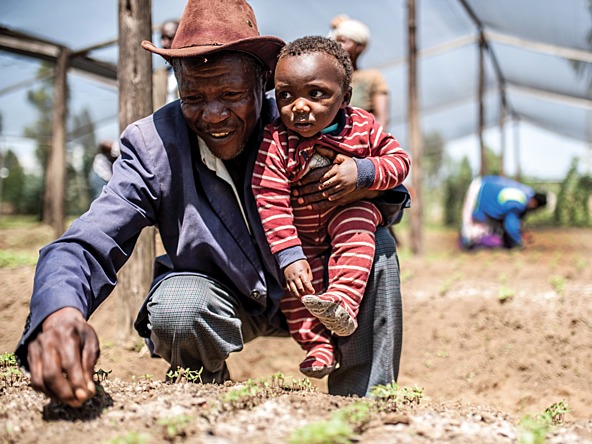Insight into charity campaigning

On 5 October 1942, as World War II raged, the Oxford Committee for Famine Relief was formed in an effort to alleviate the suffering of civilians caught up in the conflict. The group’s first campaign was to call for the relaxation of a naval blockade, so food could reach starving people in Greece, and to raise money for those in need.
Fast forward 75 years, and Oxfam is still helping people who have been hit by disaster, while striving to make poverty a thing of the past. More than 22m people worldwide benefited from its assistance in 2016 – from the provision of emergency aid in humanitarian crises to long-term development projects to improve lives in poorer communities. Oxfam also campaigns for action to tackle the root causes of poverty, such as climate change, inequality and discrimination against women.
Today, the charity is a global confederation, working in more than 90 countries. However, its British offices are still in Oxford – in an airy, modern building on a business park close to the Mini car plant in Cowley. It’s here that Oxfam GB head of insight Tina Trythall is based.
Trythall came to Oxfam at the start of 2015, after two and half years in a prominent communications evaluation role at the Cabinet Office. Earlier in her career, she worked at the Central Office of Information (COI) and still has a connection to the corridors of Westminster and Whitehall, as a member of the Government Evaluation Council. This was set up in 2013 to get to grips with evaluation best practice across all government communications activity. Trythall has brought the evaluation model she played a part in embedding across government with her into the third sector.
“The insight function at Oxfam is about putting the audience and market understanding at the heart of public support, staff engagement communications and marketing strategies,” she says. “We are ensuring our supporter – and public – engagement strategies are based on this audience understanding. It is about identifying who to target, who the audience is, to achieve our objectives. What do they know, think and feel about Oxfam?”
'Know, Think, Feel, Do’ are the four watchwords at the heart of the insight strategy. This can be seen in action in Oxfam’s work on refugees – an undoubted humanitarian crisis, but also an issue that divides opinion, even among the charity’s staunch supporters. In the minds of many people, the plight of the displaced relates to the thorny subject of immigration.
After conducting qualitative research to understand people’s feelings, Oxfam worked with insight and strategy consultancy BritainThinks to frame messages that contained human, emotional stories. “It’s about making the message relevant to people,” says Trythall. “These are families forced to flee. People can identify with families: with mothers and fathers, children and grandparents. In terms of framing our communications, we had to tell human, personal stories. We are talking about people, not a label of refugees.”
A key aspect of the refugees campaign was ongoing evaluation. Regular reporting into the team meant the campaign could be tweaked as it progressed; digital channels – and even some press activity – were optimised.
Trythall heads a five-strong insight team, which has primary and secondary research as its main remit. Insight doesn’t sit in isolation – there is much interaction with other stakeholders within the charity. One of Trythall’s key aims is to develop a more integrated and unified understanding of Oxfam’s audience and market.
“We work with other data collectors/providers within the organisation to formulate insight on a big set of data,” she explains. “We are bringing hard data alongside the soft data from research, and getting the insights from a holistic understanding, rather than just the research or behavioural data that comes from analytics. Our work with a lot of internal stakeholders to deliver the end insight product is a big role in the team, and something that has been driven quite recently.”
It’s important to clarify that Trythall and her team work for Oxfam GB – one of 19 Oxfam affiliates around the globe. It is unique in being the only insight team across the confederation. Although British audiences are the primary concern, the team occasionally gives advice to other affiliates and takes a lead on strategy development research for the global secretariat, Oxfam International.
The insight team conducts primary and secondary research, delivered through a combination of working with external agencies and undertaking its own small-scale projects. Accountability on spend is tight, Trythall points out, but she has a good mix of ex-agency and client-side experience on the team. This offers the flexibility to look at each project requirement and come up with the most cost-effective mix – be that an in-house solution or turning to an agency. Research undertaken includes: strategy development for campaigns; brand mapping; creative development; brand tracking; comms and marketing campaign effectiveness; audience segmentation; understanding the motivations of Oxfam supporters; and the organisation’s staff survey.
Where research is outsourced, it tends to be for techniques in which the team lacks sufficient skills or when it needs additional resource. One example is work with an agency to better understand Oxfam’s music festival programme. “We are looking at how our cause fits with the festival environment and how people respond to that,” says Trythall. “An external agency has helped us in terms of citizen journalists. We recruited some festival-goers, who did a citizen’s journalist piece over the days of the festival, to get a sense of what was making them tick at that moment in time. Then we did follow-up Skype interviews.”
A lid on costs
The insight team is “strongly accountable” for the money it spends. To keep costs in check, for example, the in-house team often designs its own questions for the flexible section of the monthly brand and comms tracker it uses. “We just buy fieldwork and do the complete analysis, and that really keeps a lid on costs.”
Oxfam has a network of 650 shops around the country, which – as well as playing a vital role in fundraising – is the ‘face’ of the organisation to a large extent. Campaigns are promoted in-store, but the retail setting also offers fertile ground for research. Studies among shoppers played an important role in developing Oxfam’s newspaper, which was launched recently and is distributed through the shops. After the pilot issue appeared, Oxfam again canvassed the views of shop visitors about the content.
From time to time, the insight team interviews shop managers and staff to identify issues on the ground. “They know their customer base and their community best – but you can’t always rely on shop managers because, obviously, they come with a biased view.” In addition, there has been some accompanied shopping research, walking customers through stores and then conducting group discussions afterwards, to gain insight into the retail experience and how it might be developed.
Clearly, members of the public have differing motivations for visiting a charity shop. For some, it is primarily about supporting the cause and ethical shopping; for others, securing bargains is what matters most; while for others still, it is serendipity – who knows what treasures await discovery on the shelves!
The insight team also played a role in the early-stage development of a new MyOxfam app, which allows people to control “how they want to support” Oxfam. Digital accessibility and supporter choice are big issues for the sector. Lifeboats charity RNLI announced that, from 2017, it would only contact people who had chosen to opt in. Trythall says Oxfam is “looking to move to opt in for all new supporters”, and is revising its approach to consent, in line with the forthcoming regulatory changes bound up in the General Data Protection Regulation.
Oxfam has arguably never faced greater challenges in terms of fundraising and galvanising supporters. Competition for donations is intense; there are more than 165,000 registered charities in the UK.
It is also a matter of some concern that, while fundraising by charities in fields such as cancer has held up well, there has been a “fall-off in engagement” in recent years when it comes to international development. This is not a problem exclusive to Oxfam, which has been collaborating with other charities in the sector – including sharing some insight – to find ways of reversing the trend.
“Everyone is finding it challenging,” says Trythall. “Some of that comes down to austerity. But international development is probably feeling it hardest because, not only is giving being restricted by financial considerations, but there is an attitudinal decline as well.
“The tracking we have done at a sector level shows a challenging falling-off in engagement. We have to look at how we reshape our message to engage people.”
This article was first published in the January 2018 issue of Impact.

We hope you enjoyed this article.
Research Live is published by MRS.
The Market Research Society (MRS) exists to promote and protect the research sector, showcasing how research delivers impact for businesses and government.
Members of MRS enjoy many benefits including tailoured policy guidance, discounts on training and conferences, and access to member-only content.
For example, there's an archive of winning case studies from over a decade of MRS Awards.
Find out more about the benefits of joining MRS here.












0 Comments